Unit 10 You're supposed to shake hands. Section A 1a—2d 习题课件(共37张PPT)
文档属性
| 名称 | Unit 10 You're supposed to shake hands. Section A 1a—2d 习题课件(共37张PPT) |
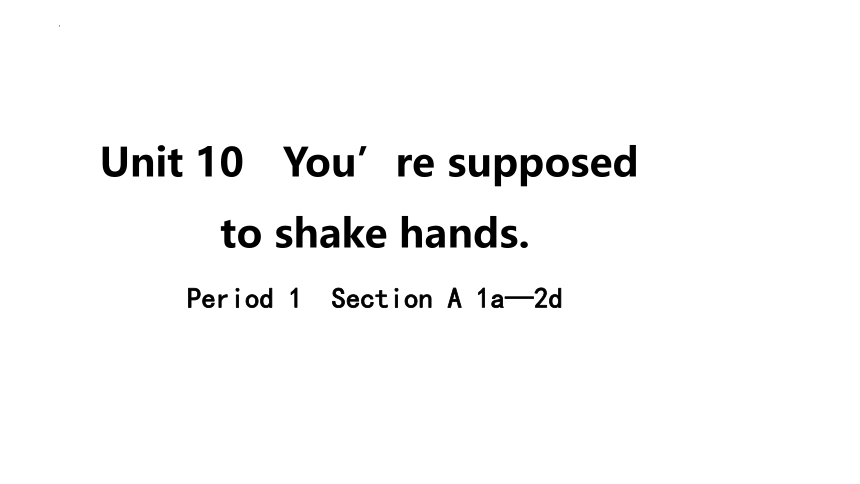
|
|
| 格式 | pptx | ||
| 文件大小 | 18.3MB | ||
| 资源类型 | 教案 | ||
| 版本资源 | 人教新目标(Go for it)版 | ||
| 科目 | 英语 | ||
| 更新时间 | 2024-05-08 14:56:38 | ||
图片预览

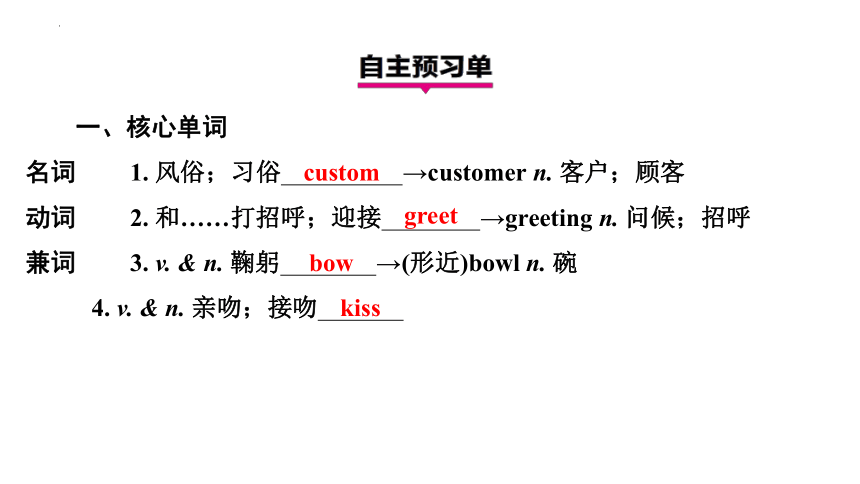
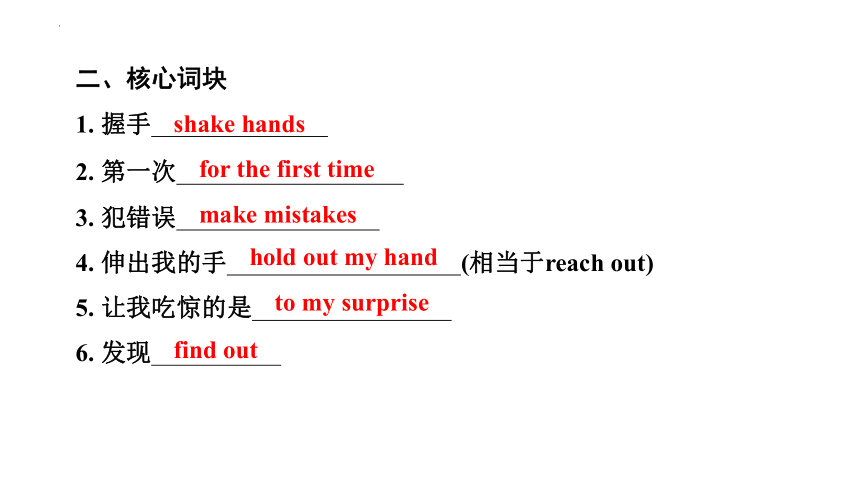


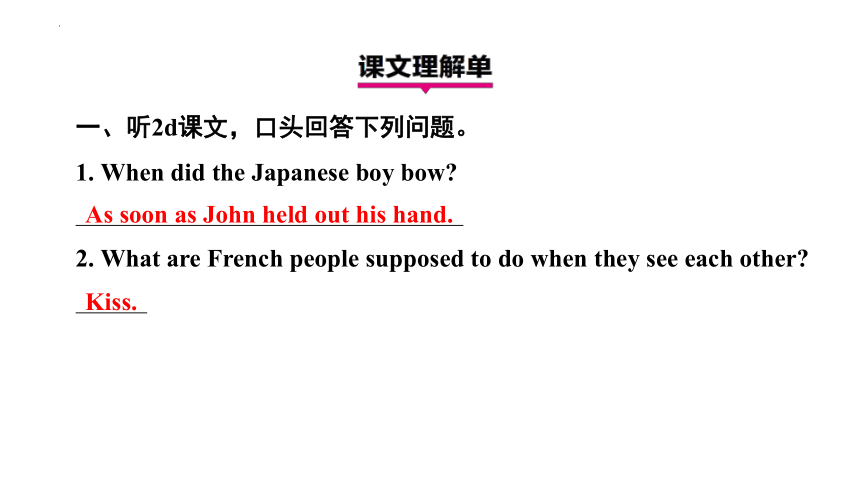

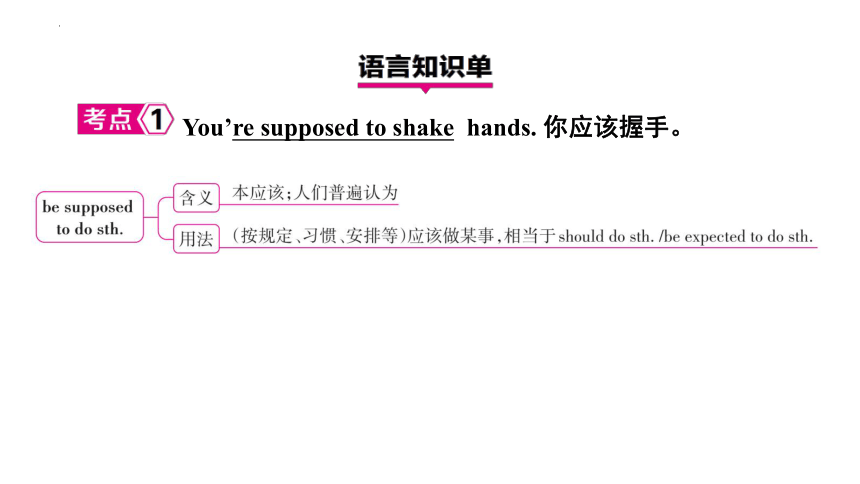
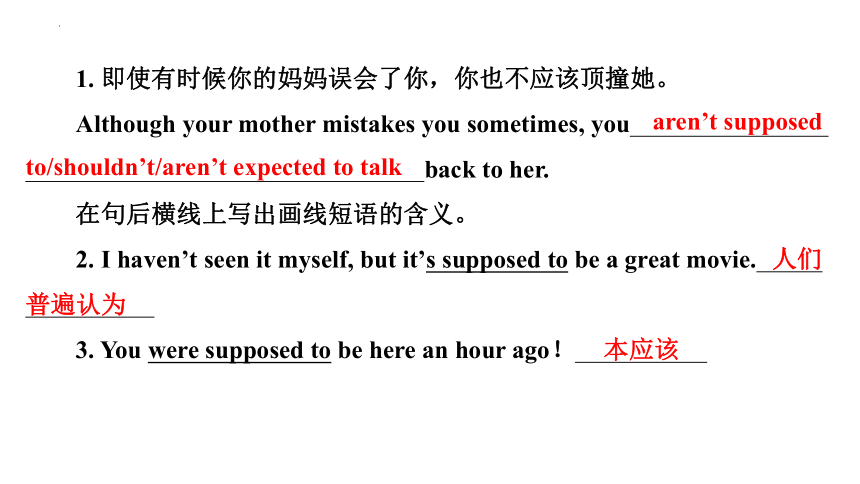
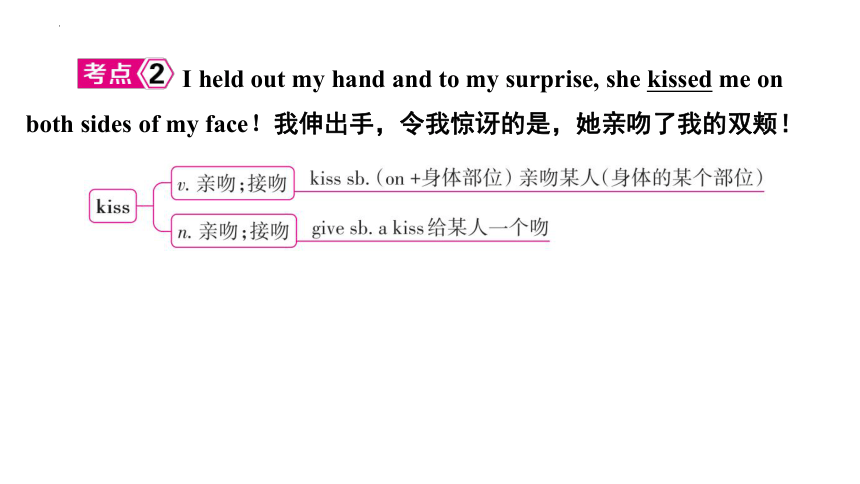
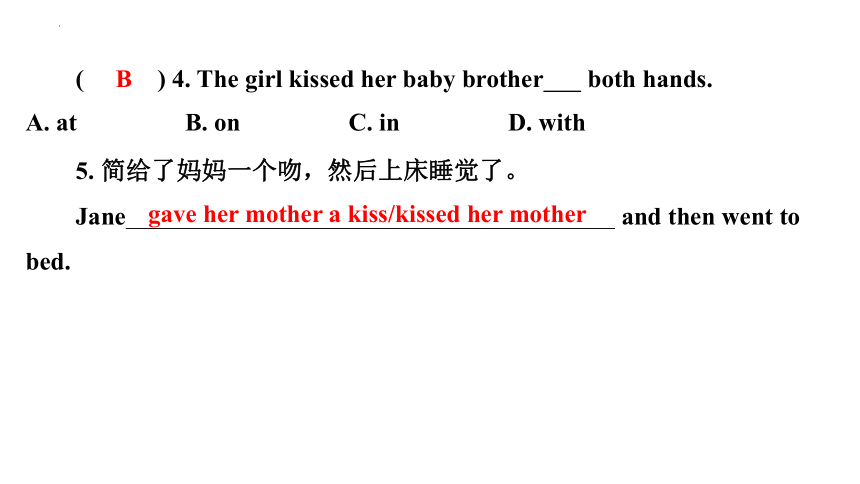

文档简介
(共37张PPT)
Unit 10 You’re supposed
to shake hands.
Period 1 Section A 1a—2d
一、核心单词
名词 1. 风俗;习俗 →customer n. 客户;顾客
动词 2. 和……打招呼;迎接 →greeting n. 问候;招呼
兼词 3. v. & n. 鞠躬 →(形近)bowl n. 碗
4. v. & n. 亲吻;接吻
custom
greet
bow
kiss
二、核心词块
1. 握手
2. 第一次
3. 犯错误
4. 伸出我的手 (相当于reach out)
5. 让我吃惊的是
6. 发现
shake hands
for the first time
make mistakes
hold out my hand
to my surprise
find out
三、核心句子
1. 我一伸出我的手,他就鞠躬。
I held out my hand, he bowed.
2. That’s how people in Japan are expected to greet each other. 那就是
在日本人们应该怎样相互打招呼。
【仿写】那就是我是怎样学习英语的。
As
soon
as
That’s how I learn English.
3. I remember when I first met Marie last year, I did the same thing.
我记得去年我第一次见玛丽亚的时候,我做了同样的事情。
【仿写】我记得我第一次来到这个城市的时候,我九岁。
I remember when I first came to this city, I was 9 years old.
一、听2d课文,口头回答下列问题。
1. When did the Japanese boy bow
2. What are French people supposed to do when they see each other
As soon as John held out his hand.
Kiss.
二、根据2d课文,完成下面的短文填空(有两词为多余项)。
culture call she greet but same kiss bow hand however
The welcome party for foreign students was great. John made some
new friends. 1. , a funny thing happened. He met a Japanese
boy 2. Sato. John held out his hand but Sato bowed. In Japan,
people 3. each other in that way. Finally, John returned the
4. . Different countries have different 5. . Last year,
when Katie met Marie, she did the 6. thing. To Katie’s surprise,
Marie kissed 7. on both sides of her face. Later Katie found out
French people are supposed to 8. when they see each other.
However
called
greet
bow
cultures
same
her
kiss
You’re supposed to shake hands. 你应该握手。
1. 即使有时候你的妈妈误会了你,你也不应该顶撞她。
Although your mother mistakes you sometimes, you
back to her.
在句后横线上写出画线短语的含义。
2. I haven’t seen it myself, but it’s supposed to be a great movie.
3. You were supposed to be here an hour ago!
aren’t supposed
to/shouldn’t/aren’t expected to talk
人们
普遍认为
本应该
I held out my hand and to my surprise, she kissed me on
both sides of my face!我伸出手,令我惊讶的是,她亲吻了我的双颊!
( B ) 4. The girl kissed her baby brother both hands.
A. at B. on C. in D. with
5. 简给了妈妈一个吻,然后上床睡觉了。
Jane and then went to
bed.
B
gave her mother a kiss/kissed her mother
一、根据句意及提示完成下列句子,每空一词。
1. Do people in Italy (握手) when they meet
2. He (伸出)his right hand and was ready to
shake hands with me.
3. (我一到达), I opened my bags.
4. Students (应该掌握) a
second language.
5. She (和我们打招呼) with a smile.
shake
hands
held/reached
out
As
soon
as
I
arrived
are
expected/supposed
to
master
greeted/greets
us
二、(2023中山三模)配对阅读
左栏是五则在华留学生的留言,右栏是七则中国网友的回复,请将
留言和回复进行匹配。
( B ) 1. When going shopping, I sometimes get a direct “No bargaining(还价)” in return. Is it not good to bargain here ( E ) 2. As a newcomer, I know little about the table manners in China. Can you tell me some of them ( G ) 3. How interesting it was!I met my Chinese roommate today. When she held out her hand, I bowed. ( C ) 4. I gave a gift to my Chinese friend on her birthday. She didn’t open it when she received it. Didn’t she like my gift ( F ) 5. Last night, I had dinner with a Chinese friend. I wanted to pay for my share of the meal but he fought to pay for the whole meal himself. A. Normally, you’re supposed to take off your shoes before entering a Chinese person’s home. But don’t worry. There will be slippers(拖鞋) for you.
B. Actually it’s very common to ask for lower prices in China. After a few minutes’ bargaining, you might get 50% off.
C. It’s not like that. You should never expect the Chinese to open gifts in front of you as this is considered impolite in China.
D. If you plan to give a gift to a Chinese, be aware that things like clocks, pears, and knives are considered to bring bad luck.
E. Well, there are several rules about using chopsticks. Don’t stick them into the food, or point at others with them.
F. Take it easy!Most Chinese people fight over the bill to show their friendliness. Maybe you can treat him next time.
G. That’s what we do in China. We are supposed to shake hands when we meet people for the first time.
B
E
G
C
F
A. Normally, you’re supposed to take off your shoes before entering a
Chinese person’s home. But don’t worry. There will be slippers(拖鞋) for
you.
B. Actually it’s very common to ask for lower prices in China. After a few
minutes’ bargaining, you might get 50% off.
C. It’s not like that. You should never expect the Chinese to open gifts in
front of you as this is considered impolite in China.
D. If you plan to give a gift to a Chinese, be aware that things like clocks,
pears, and knives are considered to bring bad luck.
E. Well, there are several rules about using chopsticks. Don’t stick them
into the food, or point at others with them.
F. Take it easy!Most Chinese people fight over the bill to show their
friendliness. Maybe you can treat him next time.
G. That’s what we do in China. We are supposed to shake hands when we
meet people for the first time.
( B ) 1. When going shopping, I sometimes get a direct “No
bargaining(还价)” in return. Is it not good to bargain here
( E ) 2. As a newcomer, I know little about the table manners in China.
Can you tell me some of them
( G ) 3. How interesting it was!I met my Chinese roommate today.
When she held out her hand, I bowed.
B
E
G
( C ) 4. I gave a gift to my Chinese friend on her birthday. She didn’t
open it when she received it. Didn’t she like my gift
( F ) 5. Last night, I had dinner with a Chinese friend. I wanted to pay
for my share of the meal but he fought to pay for the whole meal himself.
C
F
课后强化
一、根据句意及首字母或汉语提示用单词的适当形式填空,每空
一词。
1. All the patients said thanks and (鞠躬) to the doctors
and nurses.
2. (2023广州一模改编)She looked forward to experiencing Chinese
culture and (习俗) at that time.
3. (2023自贡中考)Chinese g each other by shaking hands
while Japanese bow.
4. Jane (亲吻) her mother goodnight before she went to
bed.
bowed
customs
greet
kissed
二、根据中文提示完成句子,每空词数不限。
1. (2023达州中考改编)古语有云:“吃一堑,长一智。”意思是我们
应该从错误中吸取教训,避免再犯同样的错误。
The old saying “A fall into a pit, a gain in your wit.” means we should
learn from mistakes and avoid again.
2. (2023天水中考改编)在中国,当你第一次与人见面时,你应该
握手。
You’re when meeting
people in China.
making the same mistakes
expected/supposed to shake hands
for the first time
3. (2023青海中考改编)令我们惊奇的是,当地村民在海南成功种植了
无土草莓。
, local villagers are successful in planting
strawberries without soil in Hainan.
4. 父母不应该对他们的孩子太过严厉。
be too strict with their
children.
5. 【提升题】当我伸出手的时候,他鞠躬了。
To our surprise
Parents aren’t supposed to/shouldn’t
When I held/reached out my hand, he bowed.
三、(2023滨州中考改编)完形填空
When I first arrived in China, I knew little Chinese. And some of the
Chinese words I 1 had something to do with food. I learned the names of a
few dishes, but still didn’t know most of the things I saw on Chinese
restaurant menus. Luckily, there were 2 to help me.
( A ) 1. A. learned about B. came up C. kept away D. cleared out
A
1. 考查动词短语。learned about学习;came up走上前;kept away
远离;cleared out清理。根据“I learned the names of a few dishes”可知是
学到的词汇。故选A。
三、(2023滨州中考改编)完形填空
When I first arrived in China, I knew little Chinese. And some of the
Chinese words I 1 had something to do with food. I learned the names of a
few dishes, but still didn’t know most of the things I saw on Chinese
restaurant menus. Luckily, there were 2 to help me.
( C ) 2. A. videos B. covers C. pictures D. materials
C
2. 考查名词。根据“every restaurant menu in China has pictures”可
知中国菜单上有图片可以帮助作者。故选C。
Nearly every restaurant menu in China has pictures of food on it. But
many restaurants I’ve been to in the US don’t. What is the 3 for the
difference
( B ) 3. A. result B. reason
C. choice D. list
B
One thing I’ve definitely(明确地) 4 about China is that food is a
bigger part of their culture than it is in the US. A common way to 5
someone in China is to ask them if they’ve eaten yet. Food is just a bigger
deal here — and 6 pictures of food on menus is part of that. Some menus
are almost like works of art, with beautiful photos.
( A ) 4. A. noticed B. thought C. reflected D. imagined
( D ) 5. A. introduce B. remember C. ask D. greet
5. 考查动词。根据“ask them if they’ve eaten yet”及常识可知问别人
有没有吃饭是中国人打招呼的一种方式。故选D。
A
D
( D ) 6. A. protecting B. refusing C. selling D. having
D
Another thing is the 7 of the dishes. Chinese dishes sometimes have
creative names like “three fresh things from soil(土壤)”. These are 8
names, but they don’t really tell you what the dishes are like. Therefore,
it’s 9 to have pictures so you can actually see what you are going to eat.
( D ) 7. A. plates B. colors
C. pages D. names
7. 考查名词。根据“Chinese dishes sometimes have creative names”
可知是菜的名字。故选D。
D
Another thing is the 7 of the dishes. Chinese dishes sometimes have
creative names like “three fresh things from soil(土壤)”. These are 8
names, but they don’t really tell you what the dishes are like. Therefore,
it’s 9 to have pictures so you can actually see what you are going to eat.
( A ) 8. A. interesting B. comfortable C. boring D. scary
( B ) 9. A. harmful B. helpful C. colorful D. awful
9. 考查形容词。根据“you can actually see what you are going
to eat.”可知菜单图片可以让人看到要吃的东西,所以是很有帮助
的。故选B。
A
B
There are 10 even more reasons. All I know is that I was very
thankful to have those picture menus when I first came to China years ago.
短文大意:本文主要介绍了菜单反映出的中美饮食文化的差异。
( C ) 10. A. nearly B. simply
C. probably D. hardly
C
It is said that there are kinds of traditions around the world when a child’s tooth falls out. Leaving a tooth under a pillow(枕头) for the tooth fairy(仙子) is popular in Western cultures. Here are 3 other interesting tooth traditions for you to know.
Toss(抛) the Tooth in the Air
Many children in the Middle East don’t leave their
teeth for a fairy. Instead, they go outside and toss their
四、阅读理解A篇
tooth up in the air, pointing to the sun. It will also be helpful for the growth of new teeth. They may also be even stronger than before.
Tooth on the Roof(屋顶)
In China and India, kids will toss bottom teeth on the roof. The upper ones are placed somewhere low, such as under the
bed. The teeth are hoped to be taken by a bird or mouse.
This is believed to make sure that new ones grow as fast
as possible.
Keep the Tooth Hidden
Not everyone wants to give their teeth away to animals or fairies. If a bird steals your baby teeth, it is considered bad luck in Nepal. So, children choose to hide their teeth. Burying(埋) the tooth near a hospital in Türkiye is supposed to help the child become a doctor.
Cultures are different sometimes. However, traditions
always carry people’s best wishes.
( B ) 1. How many kinds of tooth traditions are mentioned in this
passage
A. 3. B. 4. C. 5. D. 6.
B
( C ) 2. What do many children in the Middle East do when their
teeth fall out
A. They leave their teeth for a fairy.
B. They throw bottom teeth on the roof.
C. They toss the teeth up in the air.
D. They place the teeth under the bed.
C
( C ) 3. If a kid tosses his upper tooth under the bed, where may he
come from
A. Nepal. B. Türkiye.
C. China. D. The Middle East.
C
( D ) 4. Why does a Turkish kid bury his tooth near a hospital
A. To leave it for fairies.
B. To grow a more powerful tooth.
C. To help the new teeth grow fast.
D. To help himself become a doctor.
D
( A ) 5. In which part of a magazine can you read the passage
A. Culture. B. Science.
C. Health. D. Sports.
5. 推理判断题。根据“Cultures are different sometimes. However,
traditions always carry people’s best wishes.”可知,文化有时是不同的,
但是,传统总是承载着人们最美好的祝愿。所以可以在文化版块读到该
文章。故选A。
短文大意:本文主要介绍了在不同的国家孩子们是如何处理掉落的牙
齿的。
A
Unit 10 You’re supposed
to shake hands.
Period 1 Section A 1a—2d
一、核心单词
名词 1. 风俗;习俗 →customer n. 客户;顾客
动词 2. 和……打招呼;迎接 →greeting n. 问候;招呼
兼词 3. v. & n. 鞠躬 →(形近)bowl n. 碗
4. v. & n. 亲吻;接吻
custom
greet
bow
kiss
二、核心词块
1. 握手
2. 第一次
3. 犯错误
4. 伸出我的手 (相当于reach out)
5. 让我吃惊的是
6. 发现
shake hands
for the first time
make mistakes
hold out my hand
to my surprise
find out
三、核心句子
1. 我一伸出我的手,他就鞠躬。
I held out my hand, he bowed.
2. That’s how people in Japan are expected to greet each other. 那就是
在日本人们应该怎样相互打招呼。
【仿写】那就是我是怎样学习英语的。
As
soon
as
That’s how I learn English.
3. I remember when I first met Marie last year, I did the same thing.
我记得去年我第一次见玛丽亚的时候,我做了同样的事情。
【仿写】我记得我第一次来到这个城市的时候,我九岁。
I remember when I first came to this city, I was 9 years old.
一、听2d课文,口头回答下列问题。
1. When did the Japanese boy bow
2. What are French people supposed to do when they see each other
As soon as John held out his hand.
Kiss.
二、根据2d课文,完成下面的短文填空(有两词为多余项)。
culture call she greet but same kiss bow hand however
The welcome party for foreign students was great. John made some
new friends. 1. , a funny thing happened. He met a Japanese
boy 2. Sato. John held out his hand but Sato bowed. In Japan,
people 3. each other in that way. Finally, John returned the
4. . Different countries have different 5. . Last year,
when Katie met Marie, she did the 6. thing. To Katie’s surprise,
Marie kissed 7. on both sides of her face. Later Katie found out
French people are supposed to 8. when they see each other.
However
called
greet
bow
cultures
same
her
kiss
You’re supposed to shake hands. 你应该握手。
1. 即使有时候你的妈妈误会了你,你也不应该顶撞她。
Although your mother mistakes you sometimes, you
back to her.
在句后横线上写出画线短语的含义。
2. I haven’t seen it myself, but it’s supposed to be a great movie.
3. You were supposed to be here an hour ago!
aren’t supposed
to/shouldn’t/aren’t expected to talk
人们
普遍认为
本应该
I held out my hand and to my surprise, she kissed me on
both sides of my face!我伸出手,令我惊讶的是,她亲吻了我的双颊!
( B ) 4. The girl kissed her baby brother both hands.
A. at B. on C. in D. with
5. 简给了妈妈一个吻,然后上床睡觉了。
Jane and then went to
bed.
B
gave her mother a kiss/kissed her mother
一、根据句意及提示完成下列句子,每空一词。
1. Do people in Italy (握手) when they meet
2. He (伸出)his right hand and was ready to
shake hands with me.
3. (我一到达), I opened my bags.
4. Students (应该掌握) a
second language.
5. She (和我们打招呼) with a smile.
shake
hands
held/reached
out
As
soon
as
I
arrived
are
expected/supposed
to
master
greeted/greets
us
二、(2023中山三模)配对阅读
左栏是五则在华留学生的留言,右栏是七则中国网友的回复,请将
留言和回复进行匹配。
( B ) 1. When going shopping, I sometimes get a direct “No bargaining(还价)” in return. Is it not good to bargain here ( E ) 2. As a newcomer, I know little about the table manners in China. Can you tell me some of them ( G ) 3. How interesting it was!I met my Chinese roommate today. When she held out her hand, I bowed. ( C ) 4. I gave a gift to my Chinese friend on her birthday. She didn’t open it when she received it. Didn’t she like my gift ( F ) 5. Last night, I had dinner with a Chinese friend. I wanted to pay for my share of the meal but he fought to pay for the whole meal himself. A. Normally, you’re supposed to take off your shoes before entering a Chinese person’s home. But don’t worry. There will be slippers(拖鞋) for you.
B. Actually it’s very common to ask for lower prices in China. After a few minutes’ bargaining, you might get 50% off.
C. It’s not like that. You should never expect the Chinese to open gifts in front of you as this is considered impolite in China.
D. If you plan to give a gift to a Chinese, be aware that things like clocks, pears, and knives are considered to bring bad luck.
E. Well, there are several rules about using chopsticks. Don’t stick them into the food, or point at others with them.
F. Take it easy!Most Chinese people fight over the bill to show their friendliness. Maybe you can treat him next time.
G. That’s what we do in China. We are supposed to shake hands when we meet people for the first time.
B
E
G
C
F
A. Normally, you’re supposed to take off your shoes before entering a
Chinese person’s home. But don’t worry. There will be slippers(拖鞋) for
you.
B. Actually it’s very common to ask for lower prices in China. After a few
minutes’ bargaining, you might get 50% off.
C. It’s not like that. You should never expect the Chinese to open gifts in
front of you as this is considered impolite in China.
D. If you plan to give a gift to a Chinese, be aware that things like clocks,
pears, and knives are considered to bring bad luck.
E. Well, there are several rules about using chopsticks. Don’t stick them
into the food, or point at others with them.
F. Take it easy!Most Chinese people fight over the bill to show their
friendliness. Maybe you can treat him next time.
G. That’s what we do in China. We are supposed to shake hands when we
meet people for the first time.
( B ) 1. When going shopping, I sometimes get a direct “No
bargaining(还价)” in return. Is it not good to bargain here
( E ) 2. As a newcomer, I know little about the table manners in China.
Can you tell me some of them
( G ) 3. How interesting it was!I met my Chinese roommate today.
When she held out her hand, I bowed.
B
E
G
( C ) 4. I gave a gift to my Chinese friend on her birthday. She didn’t
open it when she received it. Didn’t she like my gift
( F ) 5. Last night, I had dinner with a Chinese friend. I wanted to pay
for my share of the meal but he fought to pay for the whole meal himself.
C
F
课后强化
一、根据句意及首字母或汉语提示用单词的适当形式填空,每空
一词。
1. All the patients said thanks and (鞠躬) to the doctors
and nurses.
2. (2023广州一模改编)She looked forward to experiencing Chinese
culture and (习俗) at that time.
3. (2023自贡中考)Chinese g each other by shaking hands
while Japanese bow.
4. Jane (亲吻) her mother goodnight before she went to
bed.
bowed
customs
greet
kissed
二、根据中文提示完成句子,每空词数不限。
1. (2023达州中考改编)古语有云:“吃一堑,长一智。”意思是我们
应该从错误中吸取教训,避免再犯同样的错误。
The old saying “A fall into a pit, a gain in your wit.” means we should
learn from mistakes and avoid again.
2. (2023天水中考改编)在中国,当你第一次与人见面时,你应该
握手。
You’re when meeting
people in China.
making the same mistakes
expected/supposed to shake hands
for the first time
3. (2023青海中考改编)令我们惊奇的是,当地村民在海南成功种植了
无土草莓。
, local villagers are successful in planting
strawberries without soil in Hainan.
4. 父母不应该对他们的孩子太过严厉。
be too strict with their
children.
5. 【提升题】当我伸出手的时候,他鞠躬了。
To our surprise
Parents aren’t supposed to/shouldn’t
When I held/reached out my hand, he bowed.
三、(2023滨州中考改编)完形填空
When I first arrived in China, I knew little Chinese. And some of the
Chinese words I 1 had something to do with food. I learned the names of a
few dishes, but still didn’t know most of the things I saw on Chinese
restaurant menus. Luckily, there were 2 to help me.
( A ) 1. A. learned about B. came up C. kept away D. cleared out
A
1. 考查动词短语。learned about学习;came up走上前;kept away
远离;cleared out清理。根据“I learned the names of a few dishes”可知是
学到的词汇。故选A。
三、(2023滨州中考改编)完形填空
When I first arrived in China, I knew little Chinese. And some of the
Chinese words I 1 had something to do with food. I learned the names of a
few dishes, but still didn’t know most of the things I saw on Chinese
restaurant menus. Luckily, there were 2 to help me.
( C ) 2. A. videos B. covers C. pictures D. materials
C
2. 考查名词。根据“every restaurant menu in China has pictures”可
知中国菜单上有图片可以帮助作者。故选C。
Nearly every restaurant menu in China has pictures of food on it. But
many restaurants I’ve been to in the US don’t. What is the 3 for the
difference
( B ) 3. A. result B. reason
C. choice D. list
B
One thing I’ve definitely(明确地) 4 about China is that food is a
bigger part of their culture than it is in the US. A common way to 5
someone in China is to ask them if they’ve eaten yet. Food is just a bigger
deal here — and 6 pictures of food on menus is part of that. Some menus
are almost like works of art, with beautiful photos.
( A ) 4. A. noticed B. thought C. reflected D. imagined
( D ) 5. A. introduce B. remember C. ask D. greet
5. 考查动词。根据“ask them if they’ve eaten yet”及常识可知问别人
有没有吃饭是中国人打招呼的一种方式。故选D。
A
D
( D ) 6. A. protecting B. refusing C. selling D. having
D
Another thing is the 7 of the dishes. Chinese dishes sometimes have
creative names like “three fresh things from soil(土壤)”. These are 8
names, but they don’t really tell you what the dishes are like. Therefore,
it’s 9 to have pictures so you can actually see what you are going to eat.
( D ) 7. A. plates B. colors
C. pages D. names
7. 考查名词。根据“Chinese dishes sometimes have creative names”
可知是菜的名字。故选D。
D
Another thing is the 7 of the dishes. Chinese dishes sometimes have
creative names like “three fresh things from soil(土壤)”. These are 8
names, but they don’t really tell you what the dishes are like. Therefore,
it’s 9 to have pictures so you can actually see what you are going to eat.
( A ) 8. A. interesting B. comfortable C. boring D. scary
( B ) 9. A. harmful B. helpful C. colorful D. awful
9. 考查形容词。根据“you can actually see what you are going
to eat.”可知菜单图片可以让人看到要吃的东西,所以是很有帮助
的。故选B。
A
B
There are 10 even more reasons. All I know is that I was very
thankful to have those picture menus when I first came to China years ago.
短文大意:本文主要介绍了菜单反映出的中美饮食文化的差异。
( C ) 10. A. nearly B. simply
C. probably D. hardly
C
It is said that there are kinds of traditions around the world when a child’s tooth falls out. Leaving a tooth under a pillow(枕头) for the tooth fairy(仙子) is popular in Western cultures. Here are 3 other interesting tooth traditions for you to know.
Toss(抛) the Tooth in the Air
Many children in the Middle East don’t leave their
teeth for a fairy. Instead, they go outside and toss their
四、阅读理解A篇
tooth up in the air, pointing to the sun. It will also be helpful for the growth of new teeth. They may also be even stronger than before.
Tooth on the Roof(屋顶)
In China and India, kids will toss bottom teeth on the roof. The upper ones are placed somewhere low, such as under the
bed. The teeth are hoped to be taken by a bird or mouse.
This is believed to make sure that new ones grow as fast
as possible.
Keep the Tooth Hidden
Not everyone wants to give their teeth away to animals or fairies. If a bird steals your baby teeth, it is considered bad luck in Nepal. So, children choose to hide their teeth. Burying(埋) the tooth near a hospital in Türkiye is supposed to help the child become a doctor.
Cultures are different sometimes. However, traditions
always carry people’s best wishes.
( B ) 1. How many kinds of tooth traditions are mentioned in this
passage
A. 3. B. 4. C. 5. D. 6.
B
( C ) 2. What do many children in the Middle East do when their
teeth fall out
A. They leave their teeth for a fairy.
B. They throw bottom teeth on the roof.
C. They toss the teeth up in the air.
D. They place the teeth under the bed.
C
( C ) 3. If a kid tosses his upper tooth under the bed, where may he
come from
A. Nepal. B. Türkiye.
C. China. D. The Middle East.
C
( D ) 4. Why does a Turkish kid bury his tooth near a hospital
A. To leave it for fairies.
B. To grow a more powerful tooth.
C. To help the new teeth grow fast.
D. To help himself become a doctor.
D
( A ) 5. In which part of a magazine can you read the passage
A. Culture. B. Science.
C. Health. D. Sports.
5. 推理判断题。根据“Cultures are different sometimes. However,
traditions always carry people’s best wishes.”可知,文化有时是不同的,
但是,传统总是承载着人们最美好的祝愿。所以可以在文化版块读到该
文章。故选A。
短文大意:本文主要介绍了在不同的国家孩子们是如何处理掉落的牙
齿的。
A
同课章节目录
- Unit 1 How can we become good learners.
- Section A
- Section B
- Unit 2 I think that mooncakes are delicious!
- Section A
- Section B
- Unit 3 Could you please tell me where the restroom
- Section A
- Section B
- Unit 4 I used to be afraid of the dark.
- Section A
- Section B
- Unit 5 What are the shirts made of?
- Section A
- Section B
- Review of Units 1-5
- Unit 6 When was it invented?
- Section A
- Section B
- Unit 7 Teenagers should be allowed to choose their
- Section A
- Section B
- Unit 8 It must belong to Carla.
- Section A
- Section B
- Unit 9 I like music that I can dance to.
- Section A
- Section B
- Unit 10 You're supposed to shake hands.
- Section A
- Section B
- Review of Units 6-10
- Unit 11 Sad movies make me cry.
- Section A
- Section B
- Unit 12 Life is full of the unexpected
- Section A
- Section B
- Unit 13 We're trying to save the earth!
- Section A
- Section B
- Unit 14 I remember meeting all of you in Grade 7.
- Section A
- Section B
- Review of Units 11-14
